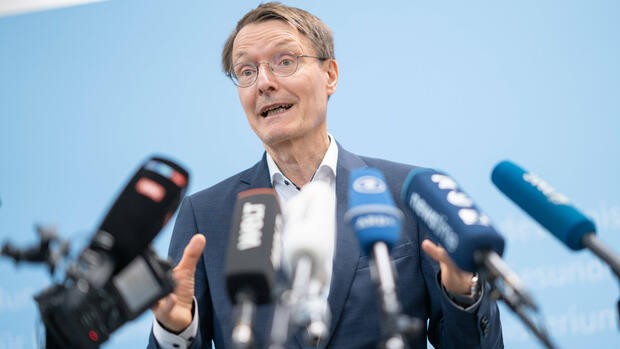Berlin The suspicion persists to this day: During the corona pandemic, clinics manipulated the number of occupied intensive care beds on a large scale in order to sneak in corona aid from the federal government. Researchers at the Leibniz Center for European Economic Research (ZEW) in Mannheim have now investigated this suspicion in a comprehensive, as yet unpublished study. It is available to the Handelsblatt.
On 39 pages, the authors Simon Reif and Sabrina Schubert deal with possible indications of fraud – and come to a clear conclusion. “There is no evidence that clinics have systematically manipulated the number of occupied intensive care beds in order to receive aid payments,” Schubert told the Handelsblatt. “The suspicion expressed at the time cannot be confirmed in the data.”
In the summer of 2021, for example, the Federal Court of Auditors criticized possible false incentives from corona payments to hospitals in a report to the budget committee of the Bundestag. Under certain conditions, clinics received financial aid that the former Health Minister Jens Spahn (CDU) had set up.
This included being in a district or urban district where 25 percent or fewer of the intensive care beds are free. In addition, the seven-day incidence had to be above the value of 70 – this value was later adjusted to 50. In total, more than 22 billion euros went to the clinics nationwide by March 2023, together with other corona aid measures. They were part of a whole series of unbureaucratic, quick support measures in the pandemic.
Because many hospitals reached their financial limits during this time and ran the risk of going bankrupt. On the one hand, the number of cases of illness fell, as many people postponed their treatments or did not use them at all out of fear of being infected with Corona. On the other hand, clinics should also reserve capacity for the treatment of Covid patients.
No strategic reports
The ZEW researchers examined how hospitals reacted to aid payments from the federal government during the second and third corona waves from November 2020 to April 2021. To do this, they used publicly available data from the intensive care register of the German Interdisciplinary Association for Intensive Care and Emergency Medicine (DIVI) as well as information from the hospital statistics of the federal and state statistical offices.
There was a lot of fuss about the information on the number of intensive care beds during the corona pandemic.
(Photo: dpa)
In order to get aid payments, the clinics would have had to adjust the number of free intensive care beds, especially if the corona incidence was above the limit values, argues Schubert. “However, there is no significant change in the number of reported free beds.”
The results would suggest that the shortage of intensive care capacities during the second and third corona waves was a direct result of the disease burden – and not strategic reports. However, the authors cannot rule out that this happened at least in isolated cases. The reason for this is the limited data situation.
The head of the German Hospital Society DKG, Gerald Gass, sees himself confirmed by the result. “This study clearly shows that hospitals used all their options to protect the population during the corona pandemic,” he told the Handelsblatt. “The repeated allegation of manipulation and enrichment in the Corona aid paid out by the federal government has not been confirmed even in analysis.”
>> Read here: Bundestag passes law against drug shortages
The Federal Court of Auditors, at least, failed to provide concrete evidence for the suspicion in its report. Among other things, the authority quotes a letter from the Robert Koch Institute (RKI) to the Federal Ministry of Health. In it, the RKI pointed out the risk of fraud in telephone calls and emails.
RKI referred to “emails and phone calls”.
In this context, the Federal Court of Auditors cites a letter from the RKI to the Federal Ministry of Health, in which there was talk of a “presumption” in this regard. The RKI referred to “numerous emails and phone calls” in which this danger was reported. There is the “supposition that hospitals sometimes reported fewer intensive care treatment places than were actually available,” it said. The RKI also recommended that the aid no longer be dependent on the reported data, as it is not meaningful enough.
Karl Lauterbach, who was not yet Health Minister at the time, spoke of an “invitation to cheat”. The SPD politician suspected that clinics had transferred patients to the intensive care unit to fill beds and thus receive aid payments. This is very simple and difficult to prove. The Greens, on the other hand, spoke of a haphazard use of taxpayers’ money.
According to ZEW researcher Schubert, however, the study shows that in emergency situations such as the pandemic, “unbureaucratic measures are often a good choice”. Of course, there were still incentives to take advantage of the aid. “But at least the clinics have apparently not made use of it, which bodes well for future help in other areas.”
More: Clinic operators fear poorer care.
